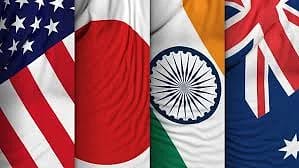
Quo Vadis, Quad?
Australia, India, Japan and the US come together to “persuade” China to see reason
Quadrilateral Security Dialogue |Photo credit: The Diplomatist
Quo Vadis? (Whither goest thou?) was the question on every body’s lips as the Foreign Ministers of four significant countries, Australia, India, Japan and the United States, known as Quadrilateral Security Dialogue (Quad) filed out of a conference room in Japan with their designer masks hiding their true emotions.
Their speeches were diverse in nuances, even though the whole world knew why they held the meeting.
Ever since the idea was proposed in 2007, there were hesitations, fears and apprehensions, even as the rationale for a setting up a group of democracies, committed to a rule based and cooperative regime in the Asia-Pacific, now christened Indo-Pacific, became evident.
The developments in the region, bordering on a perceived threat from China by the countries concerned made it imperative for them to make hesitant steps to formalise the grouping.
The time for such a move, even a risky physical meeting in these COVID-19 days at the level of Foreign Ministers, had come.
The irony is that this is a grouping driven entirely by Chinese actions. The four countries would have preferred to have a regime in the region, inclusive of China as all of them had deep involvement with China.
Even today, China can reverse the trend by simply abandoning its expansionist and aggressive policies, aimed at domination of the whole of Asia and beyond.
Out of the four countries, three have joined China’s Belt and Road Initiative, knowing well that its “all roads lead to Beijing” approach is a thinly veiled strategy for global domination. The effort of the Quad is more to persuade China to see reason, rather than to create a “mini NATO” or an “Asian NATO.”
But all indications are that China will not retract and actually invite a military alliance against itself.
The statements made by the Foreign Ministers in Tokyo showed an ascending scale of vehemence on the need for an alliance to contain China, starting with India pussy-footing on China and ending with the US calling for building a true security framework to counter the threats of the Communist Party of China. Australia’s position was closer to the US and Japan was closer to India.
Someone remarked that the four were not on the same page, though reading the same book. But in substance, they were on the same page, but reading different paragraphs, which will fall in place, if the threat from China grows.
Secretary of State Mike Pompeo was the most explicit about China’s misdeeds. “I also look forward to resolving – to renewing our resolve to protect our precious freedoms and the sovereignty of the diverse nations of the region. As partners in this Quad, it is more critical now than ever that we collaborate to protect our people and partners from the CCP’s exploitation, corruption, and coercion. We’ve seen it in the south, in the East China Sea, the Mekong, the Himalayas, the Taiwan Straits. These are just a few examples,” he said.
The Australian Foreign Minister outlined the agenda of the Quad “supporting the region’s economic recovery, strengthening health security, promoting access to safe and effective COVID-19 vaccines. In these efforts, Australia has no more important partners than Japan, the United States, and India.”
Australia has taken certain measures like banning Huawei and increasing defence expenditure to 190 billion dollars, taking the threat from China into account. Australia also condemned the “re-education camps” for Uyghurs in China.
Japan went out of its way to say that the Quad discussions were not against any specific country and pledged its commitment to security in the Indo-Pacific. India has signed with Japan an Acquisition and Cross Servicing Agreement. Given its trade and other technological cooperation, Japan is hesitant to support an alliance against China, apart from its commitments under the Constitution.
China was not even mentioned in EAM Jaishankar’s speech. “As vibrant and pluralistic democracies with shared values, our nations have affirmed collectively the importance of maintaining a free, open, and inclusive Indo-Pacific. We remain committed to upholding the rules-based international order underpinned by the rule of law, transparency, freedom of navigation in international seas, and respect for territorial integrity and sovereignty and peaceful resolution of disputes. Our objective remains advancing the security and the economic interests of all countries having legitimate and vital interests in the region.”
There was no doubt as to why he reiterated our vision of the Indo-Pacific. India has gone on record that India will not join any military alliance, but the precedent of the Treaty of Friendship and Cooperation with the Soviet Union signed prior to the Bangladesh war is an example of a pragmatic approach.
The Soviets wanted to refer to the Treaty in the Joint Communique after the visit of Prime Minister Morarji Desai, but we did not accept it as it had already become a relic and the Soviets saw the point. A number of strategic relationships could also be strewn together to meet the Chinese threat.
With all the nuances in national positions, the direction of the group was evident. It was the Chief of Defence Staff of India, who spoke about the Quad soon after the Chinese incursion. Whatever be its name, it will be part of the fortress India wants to build to defend itself against China. If China persists with its occupation of Indian land, India will need reinforcement of support from the most powerful friends it has. The meeting has put China on notice as to what it will have to face in the eventuality of a conflict.
Two imponderables, however, stand in the way of any progress in formalising the Quad. One is the uncertainty about the end of the pandemic and the shape of the world, chewed by it. The second is the totally chaotic US election with an uncertain result. Whether Trump continues or Biden takes over, the US-China relations will be in a state of flux for many months. Both these will have an impact on the Chinese threat and the likely position that the Quad members will take.
An expansion of the Quad is also possible and desirable in the days to come. ASEAN countries, particularly Vietnam and Indonesia have every reason to join in. There may be others, who may be anxious to safeguard their sovereignty and economic interests by signalling to China that they have options other than the Belt and Road Initiative. Some of the European countries may be birds of a feather in this context.
The next step that Quad may take is to give it an administrative structure even without designating a headquarters as it is committed to regular summits, information exchanges and joint military exercises. Whether it happens or not, the Quad has become a reality and only a total reversal of Chinese expansionism and adventurism can stop the Quad from crossing the Rubicon.
The caution and soft balancing we are witnessing at this stage may be just velvet gloves on iron fists.

